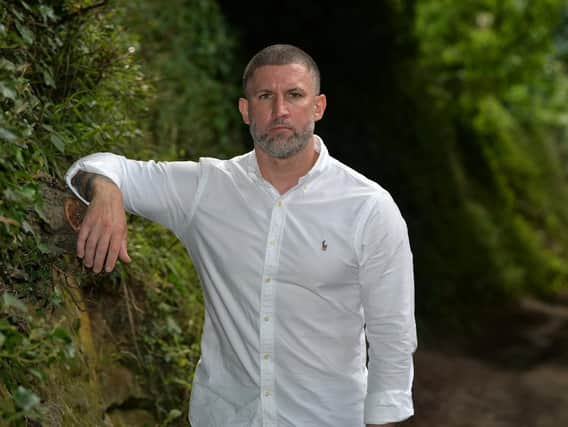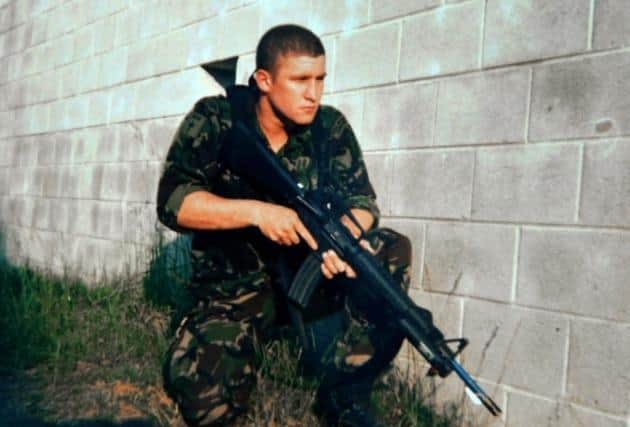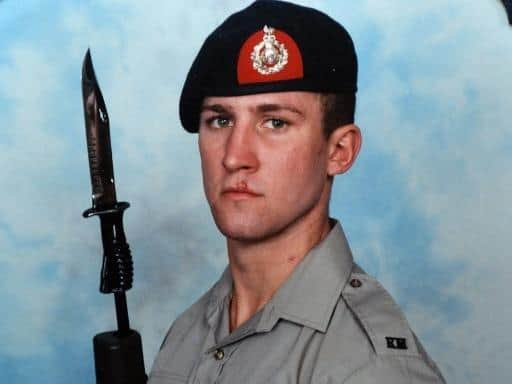Meet the man who was not only among the 0.1 per cent who make it through Royal Marines Commando training – he’s now the first to publish a diary about the experience


Seventeen years on, the daily observations he jotted down as he and his fellow recruits were pushed to their physical and mental limits has formed the basis of a unique new book.
“When I was on the platform at Wakefield Westgate, my mum gave me a diary and said, ‘Just write things down, anything, it’ll help you cope’,” the now 37-year-old Timmins recalls overZoom ahead of this week’s publication of his book Becoming the 0.1%.
Advertisement
Hide AdAdvertisement
Hide Ad“It was quite possibly the most bizarre gift she could have given me.


“At that time, I wasn’t remotely academic nor did I write anything or read anything.
“I took it, somewhat confused, and got on the train. I was just feeling really nervous and it is five or six hours on your own to get down there.
“ It is kind of like you are on a rollercoaster you can’t get off. I just opened the diary and just wrote that down, how I was feeling.
Advertisement
Hide AdAdvertisement
Hide Ad“From that moment on I just felt absolutely compelled to keep it. Sometimes when we’d had no sleep whatsoever for four or five days on the bounce, writing something was incredibly difficult but I just felt like a burning sensation that it was something I had to do. I couldn’t sleep unless I had done it.”


The book’s title is a reference to a famous advertising campaign for the Marines which stated ‘99.9% Need Not Apply’ in reference to the statistic that only one in 1,000 applicants to join them would complete training and receive a coveted Green Beret.
It not only features extracts from the diary, but also Timmins’ reflections almost two decades on as well as 34 lessons in how to develop an elite mindset - one for each of the weeks he was on the course.
Timmins’ quest to beat the odds came at a pivotal moment in his life.
Advertisement
Hide AdAdvertisement
Hide AdAs a teenager growing up in Hemsworth he had been a talented rugby league player and was offered a contract by Leeds Rhinos but took the tough decision to turn it down due to its poor financial terms.
After that disappointment, Timmins fell into drink and drug-taking and was even charged with ABH and affray after being involved in a pub fight.
He was among just 16 of the 60 recruits to make it through the gruelling initial three-day Potential Royal Marines Course.
Those who passed made it onto the formal Commando Training Course - normally a 32-week process but which was extended for a fortnight for their group because of an initial lack of enough successful recruits.
Advertisement
Hide AdAdvertisement
Hide AdTimmins initially kept his diary a secret. “On my 21st birthday, the training team ripped all my cards up and said there were no birthdays in the Marines for recruits.
“I thought if they found the diary they would rip it to pieces. I was really protective of it and I would sneak it in the field or even write notes on my arms and my hands that I would transcribe to the diary later.
“They eventually saw it but to my surprise they said it was absolutely amazing and really got behind it.”
The book provides a fascinating first-hand account of the rigours of training, including learning the ‘wet and dry’ routine involving changing in darkness from wet clothes into dry clothes before getting in a sleeping bag in order to prevent hypothermia on real operations.
Advertisement
Hide AdAdvertisement
Hide AdRecruits would be woken in the middle of the night for sentry duty and be required to put back on their cold, wet clothes - something Timmins writes was “a process that breaks even thestrongest of minds eventually”.
“He says completing the course was an incredibly emotional moment. “How they have engineered that course is that no matter who you are, how much self-confidence you have got, how strong you are mentally and physically, you don’t know you can do it until you have actually done it.”
But that joy was tempered by the warning given to him and his fellow new Commandos that of the 11 remaining original troop members, statistics suggested two or three would be killed or seriously injured within a year.
That warning would prove tragically accurate. Within three years, three of his fellow recruits - Tom Curry, Ben Whatley, and Ben Reddy - were killed in Afghanistan and Timmins has dedicated the book to them.
Advertisement
Hide AdAdvertisement
Hide AdHe says witnessing the Taliban return to power has been “absolutely tragic” for multiple reasons.
“I went in a hostile close protection role in 2013 and spent a year in Kabul. We were working with interpreters and everyone you spoke to would say, ‘We don’t want the Americans to leave us’.
“That was one of their major concerns and it has happened in the most brutal of ways you could ever imagine really.
“We were on our way to creating a democracy and the equality the women were getting and have now lost is one of the most tragic aspects of it.
Advertisement
Hide AdAdvertisement
Hide Ad“It is just incomprehensible and unfathomable that after 20 years of massive investment in time, finance and everything else it would appear it has gone to nothing.”
Timmins spent five-and-a-half years in the Marines before taking the decision to work in private security in posts that underlined the value of his Commando training.
“It helps you beyond belief. In 2011 I went out to do counter-piracy operations privately in Somalia as the team leader of a four-man team. We got attacked by about 10 or 11 skiffs of pirates. We went through the processes we had been taught automatically. That one moment is the greatest testament to who we are as Royal Marines. The odds were stacked against us but we prevailed and we took no casualties and protected the ship and the crew.
“I don’t know who designed the course but how they take a young lad at the start of training and produce an elite soldier at the end is one of the most remarkable transformations you can witness.”
Advertisement
Hide AdAdvertisement
Hide AdIn recent years, he also juggled working abroad and in roles like protection for wealthy individuals in London with studying an Open University degree in forensic psychology.
In common with so much else in Timmins’ life story, getting his book published was also an against-the-odds success.
After being rejected by around 50 literary agents, one advised him to restructure it around 34 lessons on developing an elite mindset and it ended up getting multiple publishing offers.
Timmins currently lives in Pontefract and has several business ventures on the go, including a training programme for potential military recruits.
Advertisement
Hide AdAdvertisement
Hide AdHe says writing this book has allowed him to finally put any lingering disappointment about the rugby league career that could have been behind him.
“When I started getting on with the book it was almost like I had put it to bed. Now I wouldn’t change a thing."